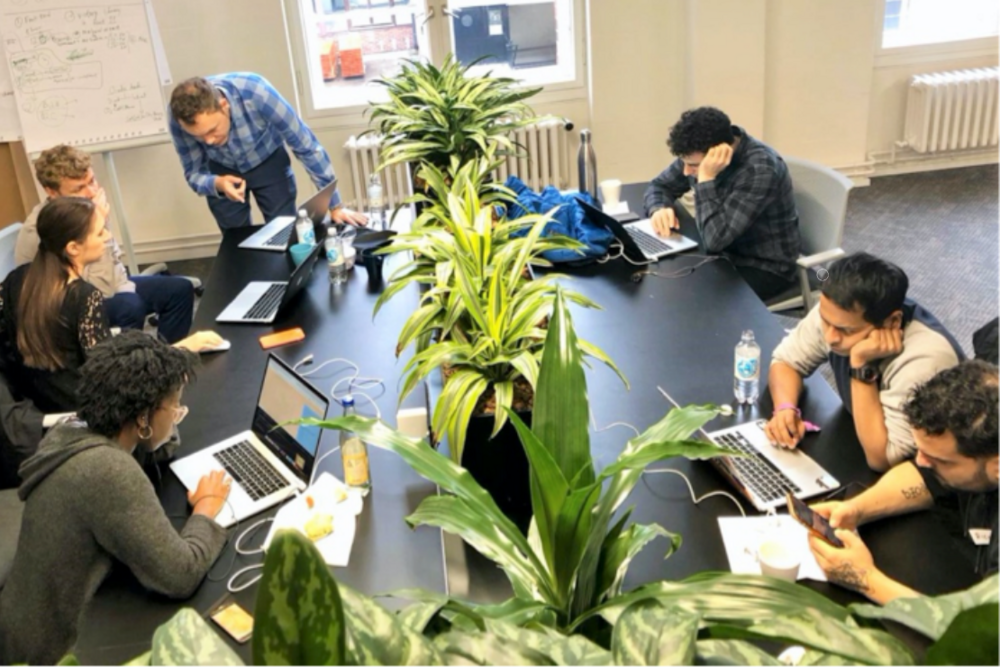#RadicalCollaboration: Rethinking Hackathons and Business Models For an Open Source Climate Accounting System
Oct 28, 2020

A collabathon node in Berlin, Germany
By Martin Wainstein, founder and lead researcher at the Yale Open Innovation Lab and founder of the Open Earth Foundation
Climate change has pushed us to embark on the most important societal and technological transformation of human history. The road to achieve net-zero emissions by 2050 requires a total renovation of our global energy infrastructure, our agricultural practices, and our fundamental relationship with nature. We must all become positive climate actors — as individuals, companies, investors, cities, and countries. Yet, as with all critical missions, the road becomes uncertain if we don’t have a clear way to quantify and track our progress on a common north. This is where climate accounting comes in. It provides a way to track accountability on climate action pledges (i.e. our promises to reduce our carbon footprint in line with science), and also monitor how climate capital is performing— how many emissions reductions are achieved per dollar invested and who gets the credit for it?
My work leading the Yale Open Innovation Lab made me appreciate the importance of robust and transparent climate accounting, but even more the importance of how we approach developing its common record keeping system. Normally, when we wish to spark fresh digital innovation ideas, we host a hackathon. But to truly harness collective intelligence on something as complex and encompassing as climate accounting, the underlying event model needed to be revisited: What if instead of having teams compete against each other for a top innovation prize, every group builds different pieces of the same puzzle? This proposition led us to design new event formats for open digital innovations. The result has been the Collabathon – a collaborative hackathon, but also a work marathon that extends throughout the year. The surprising consequence, however, has been a rich discussion on the future of how we collaborate as innovators and companies in the context of achieving planetary scale solutions.
4 Important Climate Tech Discussions We Should Be Having
For over a year, we’ve been hosting different formats of the Open Climate Collabathon, an open event mobilizing a global network of Universities, civic tech groups, startups and youth to crowd-develop an integrated climate accounting system leveraging state-of-the-art digital technologies. While the concrete results on developing a common digital infrastructure are still in its early phase, the underlying discussions and overall narrative it has sparked is perhaps the most valuable outcome so far.
In fact, these topics provide a blueprint for the climate tech paradigm ahead:
01. The open source climate internet
A net-zero emission roadmap, compass, and record keeping system would be futile if climate data was not interoperable; meaning if records of carbon emissions and reductions tracked by different parties was not easy to aggregate and reconcile at the global level. While we now have more disperse databases, registries, and ledgers to host climate data from companies, cities, and countries, we need to combine them all in order to compare these records with those observed at the atmospheric level. Because of this, the future of climate data technology has much to borrow from the design of the internet. For example, the email system we use daily would have lower value if it was not for the Simple Mail Transfer Protocol (SMTP), which enables email servers to speak to each other, allowing my Gmail message to show up in your Outlook inbox.
To manage the climate transition ahead with the digital technologies at hand, we need to realize the enabling role of communication and networking protocols; the very heart of the internet and the world wide web. The Collabathon is becoming a space for these types of dialogues to emerge, and the governance needed to define the open source nature of it.
02. Climate tech business models sharing open source digital infrastructure
The Climate Tech space is becoming an important frontier for innovation, both from a hardware and a software standpoint. However, the normal digital business paradigm, based on closed source and proprietary IP, is being challenged. On one side, this is due to a moral standpoint given that the climate action space —as defined in the Paris Agreement— needs to be built on pillars of transparency, trust, and technology transfers (i.e. collaboration between more technologically developed actors with those less developed). On the other side, this is purely from a business standpoint. Strategies focused on global interoperability are allowing for larger markets and resilient businesses rather than those focused on closed systems with ‘winner takes all’ mindset. A mainstream example for this is Tesla’s opening their patents freely to the world in 2014. This requires entrepreneurs to think about the broader ecosystem in which they operate.
We invite different climate tech startups to join the Collabathon, particularly software companies in the climate accounting space, and this issue is an important pain point that arises. How can I protect my IP and shareholders as a business whilst interoperating with my competitors to form a broader integrated network? The good news is that diligent dialogue, creativity in business models and new cryptographic tools (eg. zero knowledge proof) have great solutions for this.
03. Innovation from collaboration rather than competition
At the heart of a collaborative hackathon lies a key tension between collaboration and competition. Our historic innovation rhetoric tells us that competition is the ultimate driver for innovation— this is why monopolies tend to show very little innovation. Whilst this may be true under some scenarios, competition also consolidates a mindset of separation and zero-sum: me versus you. Existential challenges like climate change require that we transcend this mindset and realize we are all equal stakeholders of a healthy planet. Either we all win, or we all lose. An increase in social divisions, particularly acute in the United States, have showed how much harder it is to deal with a global challenge like COVID-19.
I find myself constantly repeating that collaboration is the ultimate technology we are yet to master as a civilization. This is the time to start seeing collaboration as a technology and even identify the digital tools that help us collaborate in the first place.
04. The future of work: planetary software stewards in the gig economy
An underlying thesis of the Collabathon has been that a global open source project, for which we are all stakeholders of, could be developed by having financial incentives for developers that contribute to it. A core team can publish the main code issues and present bounties for freelance developers to work on and get paid upon completion. This naturally produces tensions and competing views between intrinsic vs. extrinsic motivations from project contributors. This is definitely one of the hardest balances to strike in order to push forward high quality open digital infrastructure. However, in a post-COVID world under severe unemployment and the need for remote-friendly digital jobs, we think this may be an important landscape to explore opportunities. How can we make climate change and a common digital accounting system an ultimate model for decentralized job creation and economic boost?
These are some important areas of dialogue for the climate tech community to advance, and the Open Climate Collabathon is a ripe opportunity holding that space. Join the discussions and show up to the next global sprint.
About the Author

Martin E. Wainstein, PhD
Martin Wainstein is the founder and lead researcher at the Yale Open Innovation Lab. He is a resident fellow at the Yale Center for Business and the Environment, and held appointments at the Yale Department of Electrical Engineering, the Tsai Center for Innovative Thinking at Yale, and is a research affiliate at the Digital Currency Initiative of the MIT Media Lab. Martin is also the founder of the Open Earth Foundation.
